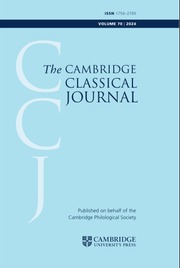Article contents
SCHOOLS, READING AND POETRY IN THE EARLY GREEK WORLD
Published online by Cambridge University Press: 28 August 2019
Abstract
This essay explores the practices through which a thin stratum of society acquired deep experience with written literature in the early Greek world. Combining a pessimistic view about the popularity of schools with an optimistic view about the stability of institutional patterns, I argue that from an early date elite ideology valorised education through the intensive study of certain written texts. Schools thus worked to institutionalise an enduring and important connection between economic capital and cultural capital acquired through reading and performing poetry. It was in the Classical period, if not before, that the interconnected practices of literate education and literary reading acquired their distinctive social character. Fully understanding the complex interface between orality and literacy in the early Greek world entails understanding some highly literate subcultures on their own terms.
- Type
- Research Article
- Information
- Copyright
- Copyright © The Author(s) 2019. Published by Cambridge University Press
Footnotes
References to early Greek philosophy, early Greek mythography, tragic fragments, comic fragments and Alcidamas look to Laks-Most, Fowler, TrGF, PCG and Avezzù, respectively. Translations are my own. For helpful comments on earlier versions of this essay I am grateful to Joshua Curk, Robert Fowler, Barbara Graziosi, Richard Hunter, Tom Nelson, Robin Osborne, William H. Race and two anonymous referees.
References
Works cited
- 2
- Cited by


